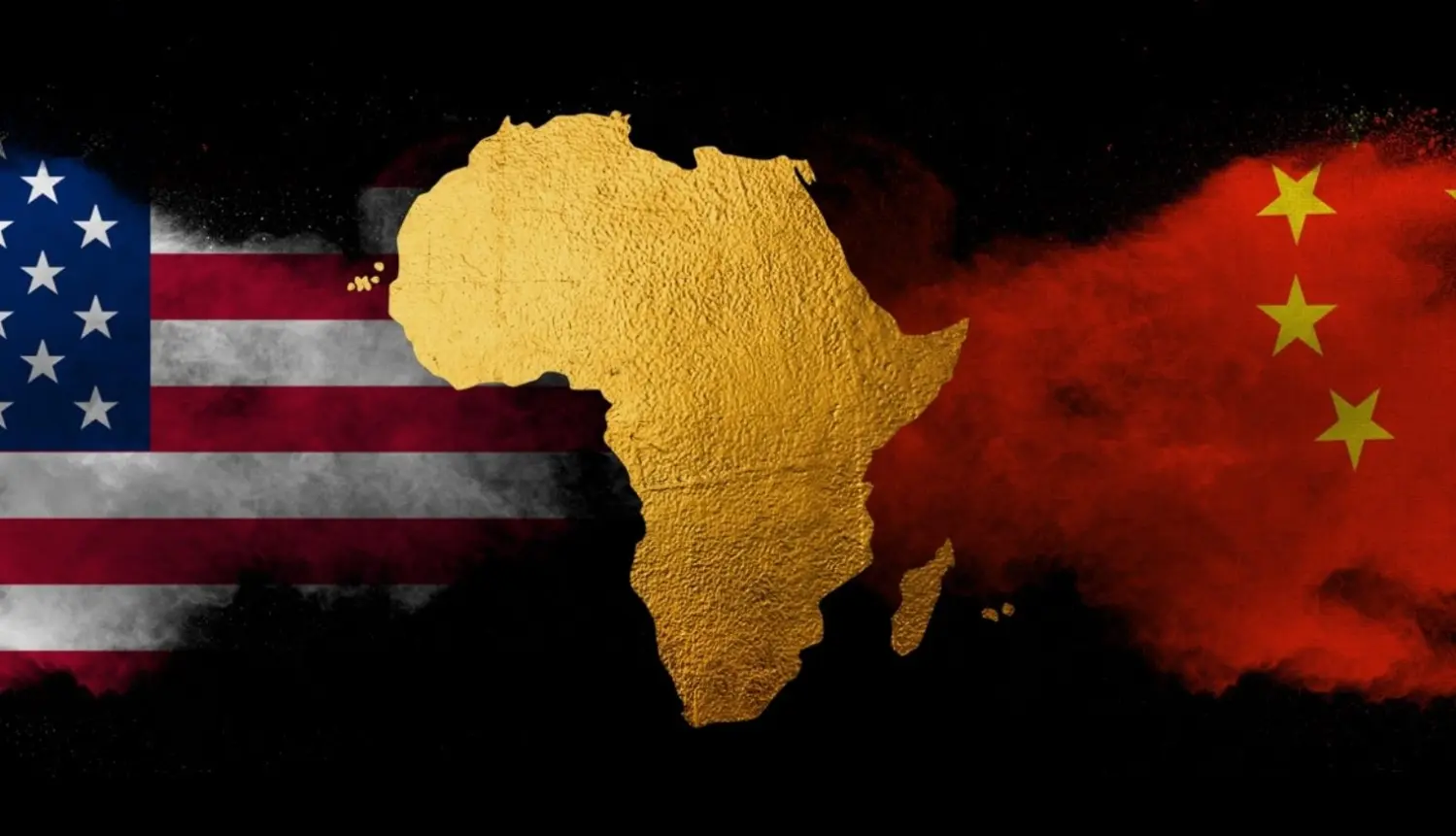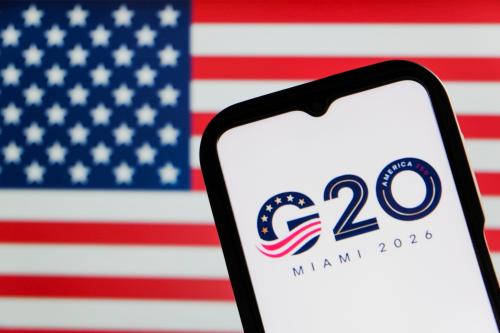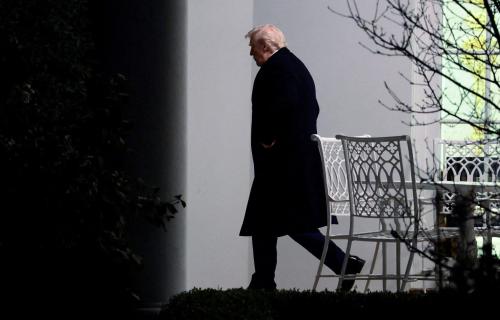Executive summary
While Africa has historically been sidelined in American foreign policy priorities, the continent is moving rapidly to the center of specific U.S. global priorities. Driven by demographic growth, critical mineral reserves, and expanding markets, Africa offers one of the clearest arenas where American interests and opportunities align. The Trump administration now faces a critical opportunity to craft a forward-looking strategy that delivers on its own foreign policy priorities: reclaiming leadership in global trade (prosperity), advancing American influence in a competitive world (power), strengthening regional and global stability (peace and security), and promoting core American ideals (principles). Given the scale of opportunity, this brief presents actionable recommendations on how the administration can act decisively across these four pillars and why doing so is both strategically sound and urgently needed.
Power: Rivalry and geopolitical competition in a changing world
China outperforms the U.S. in trade volumes with Africa by a factor of four and foreign direct investment (FDI) by a factor of two, having managed to translate its increased engagement into economic gains while also becoming the world’s leader in the control of critical minerals. Russia has expanded its military presence across the continent. Meanwhile, the Gulf States are deepening their economic and security ties with Africa. Given Africa’s increased quantity and depth of partnerships with countries around the world—including but extending beyond China and Russia—the Trump administration must deal with this reality by countering geopolitical interference with a stronger offer of investment in mutually beneficial sectors and partnerships rather than through a wholesale retraction of engagement that cedes geopolitical and economic power, and security at a moment in history where Africans will dominate the youth population and consumer markets.
Prosperity: Securing America’s economic future through trade and investment with Africa
African countries are already leveraging the Trump administration’s transactional approach to foreign policy to open new opportunities for engagement, as seen through the DRC’s minerals-for-security deal, Somalia’s port access proposal, and Rwanda’s offer to host deported migrants. As the Trump administration considers how and through what means the U.S. will engage economically with Africa, the U.S. needs a reignition and reconfiguration of support for U.S. companies and small and medium-sized enterprises (SMEs) to further invest in the continent boasting 13 of the 20 fastest-growing economies in the world in 2025. Trump’s short-lived “Liberation Day” tariffs caused panic and uncertainty over the future of U.S.-Africa trade, including whether the African Growth and Opportunity Act (AGOA) would continue to exist. Yet Trump’s stated goals of bringing industrialization back to the U.S. means that a U.S.-Africa trade deal like AGOA might actually be in the administration’s best interests, given over half of African exports to the U.S. were mineral fuels and precious stones in 2023. The U.S. should also support the implementation of the African Continental Free Trade Area (AfCFTA), which will give U.S. investors access to opportunities within one of the largest free trade areas in the world. With critical mineral deals top of mind for the administration, the administration should leverage the United States’ advantages, including technological innovation and non-extractive business models, to create long-term investment strategies that counter China’s influence, strengthen U.S. security, and create boundless economic opportunity.
Peace: Diplomacy, security, international negotiations, multilateralism, diplomacy over military intervention, and international cooperation through organizations (or local organizations)
Since 2020, Trump’s final year of his first term, six African countries have had military coups, and three African leaders have defied their constitutions to stay in power for another term. Insecurity in the Sahel has deepened and become more complex in the past four years while conflicts in East Africa have grown. Meanwhile, China and Russia have each been actively increasing arms sales to the continent amid civil wars in Sudan and Somalia and increasing threats in the Sahel. Because of how inextricably linked traditional security, including counterterrorism efforts, are with broader prosperity and power goals, the Trump administration should recognize how these drivers work together and prioritize initiatives that meet shared objectives. Instability and fragility, both a cause and effect of conflict, breed transnational threats to the U.S., including terrorism and pandemics. To minimize these threats, the Trump administration should focus on harnessing key opportunities, which include coordinating security assistance with investments in governance and economic development that could address the root causes of instability and strengthening partnerships with African-led organizations to enhance local ownership of peace initiatives and African capacity to confront regional threats before they impact U.S. interests. By supporting the African Union’s peace and stability efforts and promoting regional integration and accelerating trade, the U.S. can play a leading role in creating jobs for the growing youth population that can reduce radicalization and create long-term stability in countries and markets for U.S. investors.
Principles and soft power: Winning hearts and minds to advance national interests in Africa
With 83% of USAID programs cut and a planned withdrawal of $555 million in U.S. contributions to the African Development Bank and African Development Fund, the Trump administration is signifying its preference for transactionalism over principled engagement. It will be critical for the Trump administration to remember that reduced funding for democracy, development, and humanitarian initiatives risks undermining soft power and could jeopardize the successful implementation of prosperity-driven initiatives. The sudden withdrawal of aid in Africa is also creating a gap that China is likely to fill, which reduces the ability to achieve power-driven foreign policy goals that jeopardize the implementation of U.S. power-driven and prosperity-driven initiatives. Rather than viewing aid and trade as fundamentally at odds, the Trump administration should work on pursuing better alignment between the two, recognizing the role that aid can play in creating an enabling environment for the pursuit of U.S. prosperity goals. Aligning American principles with African-led governance goals should not be understood as in opposition to transactional foreign policy. On the contrary, it can actually promote it by creating trust, opening markets, and reinforcing U.S. credibility at minimal cost, creating a strategic advantage to making more deals rather than a concession.
U.S. and African policymakers interested in opportunities to advance mutually beneficial goals should look for areas of convergence among the four drivers while recognizing that prosperity and power will likely drive action, with significant opportunities to boost U.S. interests, recognizing how meaningful engagement with Africa offers the U.S. a clear path toward achieving their strategic objectives.
-
Acknowledgements and disclosures
The author gratefully acknowledges Brahima Coulibaly, Pierre Nguimkeu, Esther Lee Rosen, Belinda Archibong, Witney Schneidman, Stephen Lande, Nichole Grossman, Jenny Mallamo, and Molly Marotta for their thoughtful and insightful feedback. The author is also thankful to Junjie Ren, Erin Thomas, Izzy Taylor, Jeannine Ajello, Dafe Oputu, and Nicole Ntungire for their meaningful contributions. An unpublished version of this brief was included in the presidential transition briefing book, an initiative of Cecilia E. Rouse, president of the Brookings Institution, to whom the author is deeply grateful. That version has also served as talking points to brief more than 50 top policymakers.
The Brookings Institution is committed to quality, independence, and impact.
We are supported by a diverse array of funders. In line with our values and policies, each Brookings publication represents the sole views of its author(s).






